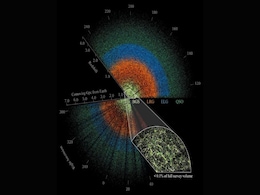Nature Astronomy
- All
- News
-

New Research Suggests Dark Energy Is Evolving, Challenging Cosmology Models
- Wednesday March 26, 2025
- Written by Gadgets 360 Staff
New research from the DESI project suggests that dark energy, once thought to be a constant force, may actually be changing over time. This challenges long-held cosmological models that assume a stable influence of dark energy on the universe’s expansion. By mapping 15 million galaxies, DESI’s data raises new questions about cosmic evolution. S...
-
 www.gadgets360.com
www.gadgets360.com
-

Scientists Discover Hidden Clues to the Dark Universe in 3D Galaxy Maps
- Thursday January 30, 2025
- Written by Gadgets 360 Staff
A breakthrough study has revealed new insights into the "dark universe," which consists of dark matter and dark energy. By using a novel technique called field-level inference (FLI), scientists have discovered previously hidden details in 3D galaxy maps. This method preserves the three-dimensional nature of the data, unlike traditional compression ...
-
 www.gadgets360.com
www.gadgets360.com
-

The Star of Bethlehem: Astronomical and Religious Mystery Explained
- Tuesday December 24, 2024
- Written by Gadgets 360 Staff
The Star of Bethlehem has sparked various theories, from astronomical events like planetary conjunctions to astrological signs. Experts, including Professor Grant Mathews and David Weintraub, have explored possibilities ranging from comets and novas to celestial alignments that guided the Magi to Jesus. Despite advances in understanding, the true n...
-
 www.gadgets360.com
www.gadgets360.com
-

TRAPPIST-1b Could Have Carbon Dioxide-Rich Atmosphere, Study Reveals
- Thursday December 19, 2024
- Written by Gadgets 360 Staff
A new study published in Nature Astronomy proposes that TRAPPIST-1b, the innermost planet in the TRAPPIST-1 system, might have a carbon dioxide-rich atmosphere. This discovery comes from new data showing a reflective haze in the planet's upper atmosphere. Scientists are also investigating the possibility of volcanic activity based on the planet’s...
-
 www.gadgets360.com
www.gadgets360.com
-

Venus Never Had Oceans or Conditions to Support Life, New Study Finds
- Monday December 9, 2024
- Written by Gadgets 360 Staff
Scientists from the University of Cambridge have concluded that Venus likely never had oceans or conditions to support life. Their study, published in Nature Astronomy, analysed atmospheric chemistry and volcanic activity. They found that volcanic gases lacked significant steam, indicating the planet's interior has always been dry. This research ha...
-
 www.gadgets360.com
www.gadgets360.com
-

Study Finds Venus Likely Never Had Oceans, Challenging Past Theories
- Thursday December 5, 2024
- Written by Gadgets 360 Staff
Recent research published in Nature Astronomy challenges past ideas about Venus, suggesting it never had oceans or conditions for life. Analysis of the planet's volcanic gases and atmospheric composition revealed that Venus’s interior is dry, ruling out the presence of liquid water. This conclusion highlights the stark contrast between Venus and ...
-
 www.gadgets360.com
www.gadgets360.com
-

Astronomers Confirm Brown Dwarf Gliese 229B as Twin Pair Orbiting in 12 Days
- Saturday October 19, 2024
- Written by Gadgets 360 Staff
Scientists have discovered that Gliese 229B, the first brown dwarf discovered 30 years ago, is actually two brown dwarfs orbiting close to each other. This unexpected find was made using the Very Large Telescope in Chile, solving a long-standing puzzle about the object's dim appearance. The twins, Gliese 229Ba and Gliese 229Bb, orbit each other in ...
-
 www.gadgets360.com
www.gadgets360.com
-

Scientists Find An Unexpected Player In Earth's Climate Cycles - Mars
- Saturday March 16, 2024
- Science | The Conversation
Our existence is governed by natural cycles, from the daily rhythms of sleeping and eating, to longer patterns such as the turn of the seasons and the quadrennial round of leap years.
-
 www.ndtv.com
www.ndtv.com
-

Europa's Icy Shell Produces Enough Oxygen For A Million People Daily: Study
- Thursday March 7, 2024
- Science | Edited by Nikhil Pandey
The ice-covered Jovian moon generates 1,000 tons of oxygen every 24 hours - enough to keep a million humans breathing for a day.
-
 www.ndtv.com
www.ndtv.com
-

Scientists Are Turning Data Into Sound to Listen to Whispers of the Universe (And More)
- Monday August 22, 2022
- The Conversation
Scientists are using data sonification, the process of converting data into sound, to understand space at a deeper level. Its use as a tool in science is still in its early stages, but astronomy groups are leading the way. A new paper, published in Nature Astronomy, discusses the current state of data sonification in astronomy and other fields, and...
-
 www.gadgets360.com
www.gadgets360.com
-

Asteroids Appear Rough Due to Space Dust Hopping on Them, Suggests Research
- Tuesday July 12, 2022
- ANI
A new study from physicists suggests that tiny grains of space dust may hop around on the surface of asteroids, making them appear rough. The study, published in the journal Nature Astronomy, may help scientists understand how asteroids bring them dangerously close to Earth.
-
 www.gadgets360.com
www.gadgets360.com
-

Researchers Create Time Machine Simulations to Study the Life Cycle of Galaxy Cities in the Past
- Tuesday June 7, 2022
- Edited by Gadgets 360 Newsdesk
Scientists from the Kavli Institute for the Physics and Mathematics of the Universe have constructed simulations that directly mimic the whole life cycle of some of the greatest collections of galaxies discovered 11 billion years ago in the distant universe. Most are simply statistically constructed to resemble the real world. Constrained cosmologi...
-
 www.gadgets360.com
www.gadgets360.com
-

Researchers Explore Potential Star System in Milky Way Which Can Burst Into Supernova
- Monday May 16, 2022
- Edited by Gadgets 360 Newsdesk
A team of researchers have found that a quadruple star system – known as HD 74438 – could represent a new channel by which thermonuclear supernova explosions can occur in the universe. In their study published in the journal Nature Astronomy, they have shown that the gravitational effects of the outer binary system are changing the orbits of th...
-
 www.gadgets360.com
www.gadgets360.com
-

Record-Breaking Eruption of Young Star Nearby Holds Warning for Earth, Say Scientists
- Saturday December 11, 2021
- Edited by Gadgets 360 Newsdesk
Scientists have warned that a nearby star experienced an energy blast at least 10 times bigger than the biggest CME the Sun has ever recorded in a warning to earth.
-
 www.gadgets360.com
www.gadgets360.com
-

New Research Suggests Dark Energy Is Evolving, Challenging Cosmology Models
- Wednesday March 26, 2025
- Written by Gadgets 360 Staff
New research from the DESI project suggests that dark energy, once thought to be a constant force, may actually be changing over time. This challenges long-held cosmological models that assume a stable influence of dark energy on the universe’s expansion. By mapping 15 million galaxies, DESI’s data raises new questions about cosmic evolution. S...
-
 www.gadgets360.com
www.gadgets360.com
-

Scientists Discover Hidden Clues to the Dark Universe in 3D Galaxy Maps
- Thursday January 30, 2025
- Written by Gadgets 360 Staff
A breakthrough study has revealed new insights into the "dark universe," which consists of dark matter and dark energy. By using a novel technique called field-level inference (FLI), scientists have discovered previously hidden details in 3D galaxy maps. This method preserves the three-dimensional nature of the data, unlike traditional compression ...
-
 www.gadgets360.com
www.gadgets360.com
-

The Star of Bethlehem: Astronomical and Religious Mystery Explained
- Tuesday December 24, 2024
- Written by Gadgets 360 Staff
The Star of Bethlehem has sparked various theories, from astronomical events like planetary conjunctions to astrological signs. Experts, including Professor Grant Mathews and David Weintraub, have explored possibilities ranging from comets and novas to celestial alignments that guided the Magi to Jesus. Despite advances in understanding, the true n...
-
 www.gadgets360.com
www.gadgets360.com
-

TRAPPIST-1b Could Have Carbon Dioxide-Rich Atmosphere, Study Reveals
- Thursday December 19, 2024
- Written by Gadgets 360 Staff
A new study published in Nature Astronomy proposes that TRAPPIST-1b, the innermost planet in the TRAPPIST-1 system, might have a carbon dioxide-rich atmosphere. This discovery comes from new data showing a reflective haze in the planet's upper atmosphere. Scientists are also investigating the possibility of volcanic activity based on the planet’s...
-
 www.gadgets360.com
www.gadgets360.com
-

Venus Never Had Oceans or Conditions to Support Life, New Study Finds
- Monday December 9, 2024
- Written by Gadgets 360 Staff
Scientists from the University of Cambridge have concluded that Venus likely never had oceans or conditions to support life. Their study, published in Nature Astronomy, analysed atmospheric chemistry and volcanic activity. They found that volcanic gases lacked significant steam, indicating the planet's interior has always been dry. This research ha...
-
 www.gadgets360.com
www.gadgets360.com
-

Study Finds Venus Likely Never Had Oceans, Challenging Past Theories
- Thursday December 5, 2024
- Written by Gadgets 360 Staff
Recent research published in Nature Astronomy challenges past ideas about Venus, suggesting it never had oceans or conditions for life. Analysis of the planet's volcanic gases and atmospheric composition revealed that Venus’s interior is dry, ruling out the presence of liquid water. This conclusion highlights the stark contrast between Venus and ...
-
 www.gadgets360.com
www.gadgets360.com
-

Astronomers Confirm Brown Dwarf Gliese 229B as Twin Pair Orbiting in 12 Days
- Saturday October 19, 2024
- Written by Gadgets 360 Staff
Scientists have discovered that Gliese 229B, the first brown dwarf discovered 30 years ago, is actually two brown dwarfs orbiting close to each other. This unexpected find was made using the Very Large Telescope in Chile, solving a long-standing puzzle about the object's dim appearance. The twins, Gliese 229Ba and Gliese 229Bb, orbit each other in ...
-
 www.gadgets360.com
www.gadgets360.com
-

Scientists Find An Unexpected Player In Earth's Climate Cycles - Mars
- Saturday March 16, 2024
- Science | The Conversation
Our existence is governed by natural cycles, from the daily rhythms of sleeping and eating, to longer patterns such as the turn of the seasons and the quadrennial round of leap years.
-
 www.ndtv.com
www.ndtv.com
-

Europa's Icy Shell Produces Enough Oxygen For A Million People Daily: Study
- Thursday March 7, 2024
- Science | Edited by Nikhil Pandey
The ice-covered Jovian moon generates 1,000 tons of oxygen every 24 hours - enough to keep a million humans breathing for a day.
-
 www.ndtv.com
www.ndtv.com
-

Scientists Are Turning Data Into Sound to Listen to Whispers of the Universe (And More)
- Monday August 22, 2022
- The Conversation
Scientists are using data sonification, the process of converting data into sound, to understand space at a deeper level. Its use as a tool in science is still in its early stages, but astronomy groups are leading the way. A new paper, published in Nature Astronomy, discusses the current state of data sonification in astronomy and other fields, and...
-
 www.gadgets360.com
www.gadgets360.com
-

Asteroids Appear Rough Due to Space Dust Hopping on Them, Suggests Research
- Tuesday July 12, 2022
- ANI
A new study from physicists suggests that tiny grains of space dust may hop around on the surface of asteroids, making them appear rough. The study, published in the journal Nature Astronomy, may help scientists understand how asteroids bring them dangerously close to Earth.
-
 www.gadgets360.com
www.gadgets360.com
-

Researchers Create Time Machine Simulations to Study the Life Cycle of Galaxy Cities in the Past
- Tuesday June 7, 2022
- Edited by Gadgets 360 Newsdesk
Scientists from the Kavli Institute for the Physics and Mathematics of the Universe have constructed simulations that directly mimic the whole life cycle of some of the greatest collections of galaxies discovered 11 billion years ago in the distant universe. Most are simply statistically constructed to resemble the real world. Constrained cosmologi...
-
 www.gadgets360.com
www.gadgets360.com
-

Researchers Explore Potential Star System in Milky Way Which Can Burst Into Supernova
- Monday May 16, 2022
- Edited by Gadgets 360 Newsdesk
A team of researchers have found that a quadruple star system – known as HD 74438 – could represent a new channel by which thermonuclear supernova explosions can occur in the universe. In their study published in the journal Nature Astronomy, they have shown that the gravitational effects of the outer binary system are changing the orbits of th...
-
 www.gadgets360.com
www.gadgets360.com
-

Record-Breaking Eruption of Young Star Nearby Holds Warning for Earth, Say Scientists
- Saturday December 11, 2021
- Edited by Gadgets 360 Newsdesk
Scientists have warned that a nearby star experienced an energy blast at least 10 times bigger than the biggest CME the Sun has ever recorded in a warning to earth.
-
 www.gadgets360.com
www.gadgets360.com
















